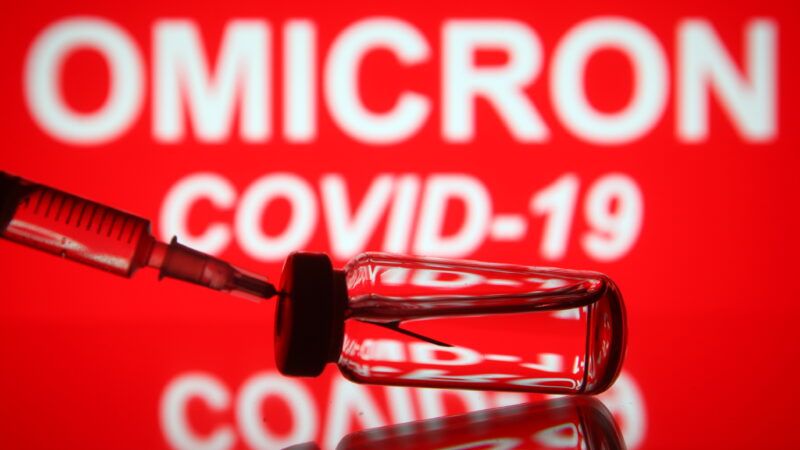The Omicron COVID-19 Wave Is Here Now and Rising Fast
Researchers are still uncertain about how severe the variant will be.

The "viral blizzard," "tidal wave," and "tsunami" of COVID-19 infections predicted by epidemiologists and virologists is fast oncoming as the omicron variant is now responsible for 73 percent of new coronavirus infections in the U.S. Outgoing National Institutes of Health director Francis Collins warned that COVID-19 cases could rise to 1 million per day in January.
The omicron variant, according to some preliminary estimates, is about 25–50 percent more infectious than the already highly contagious delta variant. Researchers at Hong Kong University report that over 24 hours the omicron variant replicates in human respiratory tract tissue 70 times faster than does the delta variant. This high viral load increase may be what enables the variant to transmit more quickly between people.
The spread of the delta variant has been slowed by the fact that two doses of the Moderna and Pfizer/BioNTech mRNA vaccines offer substantial protection against infections and significantly lowered the risks of hospitalization and death from breakthrough cases. The Centers for Disease Control and Prevention (CDC) estimated that unvaccinated people were nearly five times more likely to become infected with the delta variant than people who have been inoculated. As a result, the majority of the COVID-19 cases in the U.S. have occurred among the unvaccinated for the past four months.
In contrast, preliminary data from the United Kingdom suggests that the omicron variant more readily breaks through the immune protection provided by two vaccine doses or recovery from infections caused by earlier variants. Specifically, disease modeling results from researchers at Imperial College London estimate that protection against COVID-19 reinfection by omicron afforded by past infection may be as low as 19 percent. They similarly reckon that two doses of COVID-19 vaccines are only about 20 percent effective against symptomatic infections and may be as low as 0 percent.
Nevertheless, two doses of vaccines do still offer considerable protection against severe disease caused by omicron variant infections. The Imperial College London researchers estimate that a booster dose is between 55 and 80 percent effective at preventing symptomatic infections. People vaccinated with two doses, those who have recovered from a prior infection and the unvaccinated are all vulnerable to infection by the omicron variant which means that it has a much greater opportunity to spread even more rapidly than the delta variant has done.
With respect to booster shots, both Pfizer and Moderna report that third shots of their vaccines increase virus-fighting antibodies by more than 25-fold and 37-fold respectively. In addition, researchers suggest that vaccination may have primed T-cells—the next line of our bodies' immune defenses—to fight off infections caused by the omicron variant.
Researchers are still uncertain as to how the omicron variant will affect hospitalization and death rates. In its recent risk assessment, the U.K.'s Health Security Agency reports that "on the data available in the UK, there is no signal that supports a difference in the intrinsic virulence of the Omicron virus compared to Delta." In other words, omicron may be as severe as delta which would be really bad news since more people are susceptible to the new variant.
On the other hand, data from South Africa hint that the new variant produces milder symptoms. In fact, COVID-19 hospitalizations and deaths there have been lower than those resulting from the delta variant surge. However, some researchers caution that past infections and vaccinations may be the reason why omicron infections in South Africa appear to be milder. It is also worth noting, however, that the Hong Kong University study found that the omicron variant replicated much less efficiently (10 times lower) in human lung tissue than the original virus did, which may suggest a lower severity of disease.
Only about 30 percent of fully vaccinated Americans have so far gotten a COVID-19 booster shot. Since it takes about two weeks for a booster shot to reach full effectiveness, it would be a good idea to get vaccinated and boosted sooner rather than later. The omicron wave is here and rising fast.
Disclosure: I mixed a Pfizer/BioNTech booster in October with my two earlier doses of Moderna vaccine. My assessment of the omicron wave prompted my wife and me to cancel our long-scheduled plan for a vacation trip this week to Miami Beach.
